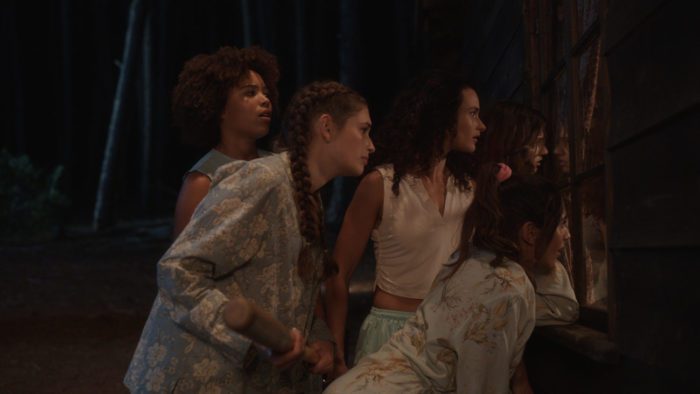Like The Town That Dreaded Sundown (2014) and Candyman (2021), Slumber Party Massacre is set in the shadow of a gruesome crime that was committed to a previous generation. Unlike those, (though this film does not continue the story of its own predecessor), it is a “reimagining” of Amy Holden Jones’s 1982 cult classic, overturning some eighties slasher tropes along the way.
The scenario is this: a group of late-teen women heads off for a weekend away to celebrate the end of school, but their car breaks down (wouldn’t you know?) and they are obliged to change their plans. The hick town they end up renting a house in just happens to be the place where an infamous “driller killer” slaughtered four people nearly 30 years earlier, and one of these young women, Dana (Hannah Gonera), is the daughter of the sole survivor.
The gang of girls is Dana, Ashley (Reze-Tiana Wessels), Maeve (Frances Sholto-Douglas), and Breanie (Alex McGregor); oh and Alix (Mila Rayne), Maeve’s sister, who wasn’t actually invited. Slumber Party Massacre is about them, to a large degree: we don’t get any of their backstories (except in relation to Dana’s mother), but their bond is clear. They don’t have to share the same agendas but look out for each other and they support each other’s interests and personal growth. They’re not complex characters, but they certainly are less shallow than such a group might have been presented in the eighties slasher heyday.
I’m not going to compare Slumber Party Massacre to the original film in much detail, but this version certainly is a call out to fans of horror films to recognize how some things have changed, while a great deal of what we love is still there to be embraced. The group of men staying at another nearby holiday home are clearly there to present the contrast: the half-naked pillow fight and the gratuitous shower scene take place amongst them, not the women this time. This is the band of bimbos, so superficial that two of them don’t even merit names of their own, and they tar the young women with a suspicious brush in exactly the way that the female group refuses to do to men. Young women have changed over time, just as horror cinema has changed, and Slumber Party Massacre dares to show that (not all) men can find these changes unnerving.

There’s one SPM tradition that this film does follow: each film to date has been written and directed by women, and now this one is directed by Danishka Esterhazy and written by Suzanne Keilly. They very deliberately set out to enhance the “female gaze,” because it’s pretty evident by now that no film is a feminist one simply by virtue of being made by women. While the female group in the film provides the central characters, none of them are obliged to get their clothes off and none require any male partner in order to have purpose or context. Interestingly, male and female characters alike in this new Slumber Party Massacre can be sensitive, can scream, can fight, and can kill; and any of them can panic or make mistakes, but it’s the women who have the staying power.
Suzanne Keilly’s plot is as full of tricks as it is of nods to familiar models. A little like Cabin in the Woods, she lets us think we know where the film is going and then smiles sagely at our naiveté. Sure, we’ve seen slashers before, we’ve seen reboots and feminist rewrites before, but don’t let that fool you into thinking there’s any kind of comfort zone to be found here; as soon as the viewer settles down, things are shaken up, and then again and again. Don’t worry though: if The Slumber Party Massacre was an old favorite, this version doesn’t trample on it or sneer at it. I have no doubt Keilly has some affection for her source material; the satirical moments may point out how times have changed, but the mildness of the humor means that no one is being laughed at.

Danishka Esterhazy knows how to direct surprises, as you may have seen in Level 16. The tone and pace change along with the story, but there are few jolts in those changes and no dull moments at all. Unfortunately, by about halfway through, once you can see what the film is doing, it becomes…well I’m reluctant to say predictable, but a little too easy to piece together perhaps and Slumber Party Massacre settles into familiar territory for the final stretch. All in all, it does work; but I wonder if an extra ten or twenty minutes could have allowed for an explanation of the killer and a more satisfying conclusion.
These are small niggles, though. Slumber Party Massacre is an entertaining and fun film; just as much so on a second watch, too. Its use of the generational perspective on social (and genre) progress is interestingly done without being heavy or preachy…and just to make sure nothing gets too serious, there are some truly gory kills! Despite the main weapon being simply a drill, the variety in the violence is striking, and the gore effects impressive; on one hand (or face, now that I think of it), the dead flesh seems real enough to touch (ew!) but nothing is quite so gritty or realistic that I can imagine being there. This is a bright, bouncy, and triumphant film; quite like a bunch of teenagers who have come face to face with a killer.


